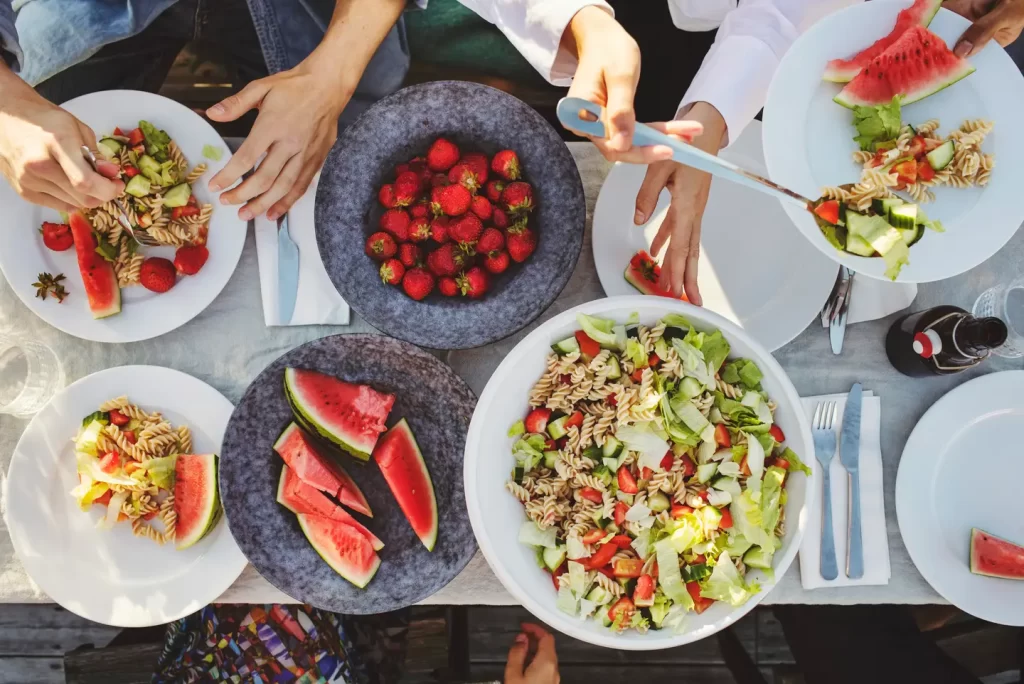Fat-Less Diet Plan for Vegetarians and Vegans
3 min read
Vegetarians and vegans need to plan meals that contain sufficient proteins, vitamins, and minerals, and avoid foods high in sodium, added sugars, or saturated fat.
A healthy meal plan comprises foods and beverages rich in nutrients while limiting sodium, added sugars, saturated fat and trans fat intake. EatThisMuch meal plans provide easy ways to meet calorie needs while providing balanced nutrition.
Protein
No matter the type of vegetarian diet you follow, protein intake should always be an integral component. Protein helps build and repair tissues – including muscles – as well as aiding in digestion and being an essential nutrient for growth and development. Good sources include eggs, dairy products, quinoa, beans lentils and nuts as well as fortified foods such as soy milk or yogurt that provide fortified proteins or by adding legumes into meals.
As part of your weight management plan, it is also wise to limit ultra-processed plant-based foods which often contain added sugars and fats. Such processed food items tend to be high in calories and lead to weight gain; by restricting them you could potentially cut back on sodium intake which has also contributed to this process. It would be ideal if you could replace processed plant foods with whole, unprocessed plant foods for maximum health benefits.
Calcium
Consuming more plant foods such as beans and lentils can provide essential calcium, which plays an essential role in keeping bones strong. You can also get calcium from fortified milk and soy beverages as well as leafy veggies and whole grains.
People who opt to become vegetarian or vegan may require increased levels of calcium, iron, choline, B12 and omega-3 fatty acids in their diets. Furthermore, it’s essential that they consume protein-rich foods along with healthy fats such as those found in nuts and seeds, avocados and olive oil for maximum nutritional health benefits.
Vegetarians who follow a balanced diet can meet their nutritional requirements by choosing whole, unrefined foods while limiting added sugar, salt, and saturated fat intake. Working with a registered dietitian is also helpful to ensure an individual meal plan caters specifically to them and their specific dietary requirements.
Vitamin D
Vegetarians may face unique nutritional challenges when trying to meet their dietary requirements, especially protein, iron, vitamin B12, calcium and zinc – nutrients more difficult to acquire from plant foods and may require supplements. Furthermore, pregnant and breastfeeding women need enough folic acid and iodine in their diets for proper development during gestation and lactation.
An adequate vegetarian diet can provide these nutrients, but for optimal results it is wise to consult a registered dietitian as part of your health strategy and goals. This is especially important for people following Dean Ornish, MD’s very low-fat diet which limits fat to less than 10% of calories consumed per day.
Vitamin B12
Vegan diets tend to be deficient in vitamin B12. This can contribute to cognitive decline and neuropsychiatric disorders as well as anemia characterized by fatigue and weakness due to low red blood cell counts.
Solution: Eating foods enriched with vitamin D such as plant milks, cereals and nutritional yeast may help. Furthermore, sunbathing will aid your body’s production of Vitamin D.
Some vegetarians who choose flexitarian diets still consume meat and seafood from time to time, a practice known as the flexitarian diet. When properly planned and monitored by an registered dietitian, this approach may be healthy. Vegetarian eaters should also pay close attention to high-fat plant foods like nuts, avocados and nut butters which contain 9 calories per gram – an especially useful calorie count when trying to lose weight.
Fiber
Fiber, the indigestible part of plant foods, plays an essential role in weight management and hunger control, as well as helping regulate blood sugar and maintaining a healthier gut microbiome. Try incorporating more fibrous-rich foods such as whole grains, legumes, fruits and vegetables into your daily menu for optimal results.
Protein-rich vegetarian foods include tofu, edamame, tempeh and soy-based yogurts; beans and lentils; quinoa, amaranth and kamut; nut butters; eggs; dark green vegetables. Furthermore, dark leafy vegetables, fortified cereals, enriched soy milk, tofu nut butters and sesame tahini contain lots of iron!
Vegetarians may be at greater risk of nutritional deficiencies if their diets are restrictive; however, with careful planning most nutrients can be met in sufficient amounts from vegetarian food sources. Pregnant or breastfeeding women may require supplemented folic acid and iodine levels while vitamin B12 supplementation is often necessary for vegans.







